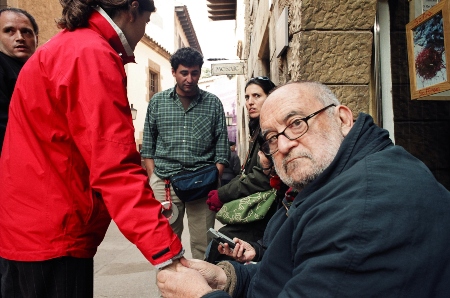About the Center
“He tractat sempre que traduir fos una mena de passió i, per a això, ha d’haver-hi un descobriment permanent. La forma –més o menys fictícia– era no haver llegit el llibre, anar-lo descobrint segons l’anava traduint. És evident que això no es pot dir en públic, però crec que és així: traduir és un treball, però pot ser una cosa apassionant”
(Joaquim Jordà entrevistat per María Ángeles Cabré i Dolors Udina el 2003, Vasos Comunicantes Nº 26)
Filmmaker, screenwriter, translator, professor. In this multifaceted nature, Joaquim Jordà’s footprints have managed to survive, leaving their marks on filmmakers, spectators and pupils. Nonetheless, shaping this intangible influence requires the weight of patrimony, the materialization of a legacy that is able to speak for itself. This was the main motivation of a group of researchers from the Communication Department of the UPF, who founded Numax. Centre for Studies Joaquim Jordà not only as recognition for one of the most important figures of Catalan and Spanish cinema, but also as an opportunity to preserve Jordà’s commitment with reflection and culture.
In order to achieve this, the centre, constituted on the tenth anniversary of Jordà’s demise, aims both at the recuperation of the filmmaker’s personal archive as well as its amplification, incorporating unedited materials and films that were recently discovered. The drive for research surrounding his figure and the ideas that were highlighted in his work is also one of the key goals of the centre, as well as the possibility to fortify dissemination activities.
This initiative, of a collective nature, gathered the UPF with institutions such as the Filmoteca de Catalunya, the Fundació Tàpies and the Santa Coloma de Farners city council, together with Mr. Jorge Herralde, editorial director at Anagrama, where Jordà developed his career as a translator.
With the filmmaker’s archive as one of its axis, the centre is dedicated to the management of material, also leading initiatives of dissemination and cession, and working together with the Santa Coloma de Farners city council (proprietor of the Jordà archive thanks to a donation by the filmmaker) and the Filmoteca de Catalunya (temporary custodian of said originals). Furthermore, with preservation and diffusion as key aspects of this collaboration, the Library/CRAI of UPF will also contribute with the digitalization of the material and its free access through Internet.
One of the first tasks that Numax. Centre for Studies Joaquim Jordà has set out to achieve is the recuperation of all the filmic materials developed by Jordà, in order to catalogue and analyze them, including both his complete works as well as complementary materials, located in production companies and international archives. This recompilation will also give room for researchers centred on Jordà who investigate the different periods of his work, as well as the themes that span through his films.
“Alguns dels meus exalumnes m’acostumen a dir que en alguns moments dels seus treballs pensen en mi, però jo crec que el que en realitat volen dir és que els agradaria xerrar amb mi, no interrogar-se sobre si jo faria així tal o qual cosa. No és model ni referència, sinó un poder parlar, un poder seure a debatre (...). Jo visc la meva docència com un intercanvi (...). El que no intento, perquè no està al meu temperament, és imposar-los una forma de fer, entre altres coses perquè jo tampoc la tinc”
(Joaquim Jordà en Riambau, Esteve; Salvadó Corretger, Glòria; Torreiro, Casimiro. "A mí la normalidad no me gusta: Un largo encuentro con Joaquín Jordà". Nosferatu, 52, pp. 40-79.

[Website pictures are courtesy of Santa Coloma de Farners City Council]
